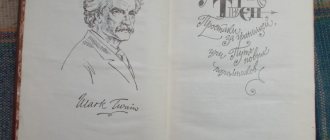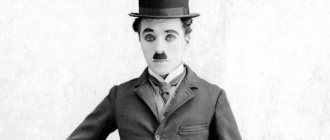Childhood and youth
Muslim Magomayev was born on August 17, 1942 in Baku. Father Magomet Magomayev died at the front, 15 days short of the great Victory. Before the war, Magomet Muslimovich worked as a theater artist. Muslim Magomayev’s mother Aishet is a dramatic actress who took the pseudonym Kinzhalova. Turkish, Adyghe and Russian blood flowed in her veins. Muslim considered himself an Azerbaijani and Russia as his mother. The grandfather of the future artist is the Azerbaijani composer Abdul-Muslim Magomayev, the founder of national classical music.
After the war, Muslim Magomayev and his mother went to Vyshny Volochek, where the actress Kinzhalova was thrown by creative fate. The boy studied at a music school for a year and became friends with his classmates, infecting the children with the idea of creating a puppet theater. Muslim made the puppets for performances himself. But Aishet sent her son to Baku, where, in her opinion, the musically gifted boy would receive the best education.
Published by Muslim Magomaev. Muslim Magomaev Sunday, August 13, 2021
Muslim Magomayev in his youth
In Baku, Muslim Magomayev grew up in the family of his uncle Jamal Muslimovich. Mother from Vyshny Volochok moved to Murmansk, where she worked at the local drama theater. Aishet married a second time and Muslim had a brother, Yuri, and a sister, Tatyana.
In his hometown, the guy plunged headlong into music. Muslim Magomayev spent hours listening to the “trophy” records of Enrico Caruso, Mattia Battistini and Titta Ruffo.
Next door to his uncle lived the family of the famous Azerbaijani singer Bulbul, and Muslim listened to the star singing in the mornings. Magomayev became friends with Bulbul’s son, Polad.
The boy’s successes at the music school at the Baku Conservatory, where his uncle took him, turned out to be half-hearted: in piano, solfeggio and choir lessons, Muslim was given the highest scores, but in physics, chemistry and mathematics, according to Magomayev, his brain “switched off.”
Cellist and professor Vladimir Anshelevich noticed a capable student and took him under his wing. The mentor showed the young vocalist how to sharpen his voice. Soon, the experience gained helped Muslim Magomayev in his work on the role of Figaro in the opera The Barber of Seville.
At the Baku Music College, the singer improved his vocals. His mentors were Alexander Milovanov and accompanist Tamara Kretingen, who devoted free time to the student. Magomayev was awarded the diploma in 1959.
short biography
Muslim Magomayev in different periods of his life
Let us immediately note that Muslim Magometovich was lucky enough to be born into an illustrious creative family of Azerbaijan, which originates from his grandfather, the famous original composer, Magomet Magomayev.
The father of the future brilliant singer and composer was also an extraordinary person; he found the application of his creative potential in the applied arts.
The talented artist worked in the most famous theaters of Baku as a graphic designer, however, the war interrupted his creative life, Magomet Magomayev went to fight. He was no longer able to return home; he died in Berlin a few days before the victory, when his son was already three years old.
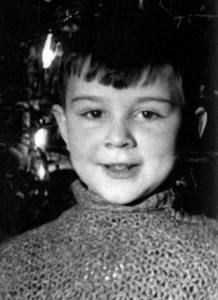
Muslim Magomayev in childhood
Magomayev was born at the most difficult time for the country, it was 1942, on August 17, Aishat Magomayeva, the mother of the future celebrity, gave the world an extraordinary personality.
It should be noted that the famous singer’s mother was also a gifted person, a talented dramatic actress worked in the theater under the pseudonym “Dagger”, and was awarded a Stalin scholarship, which speaks of her creative merits.
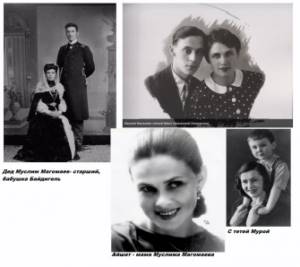
Family of Muslim Magomayev
Why did nature not be stingy and endowed the future vocalist not only with an amazing voice, the talent for a unique perception of music and the ability to compose it, but also with excellent external characteristics.
Trying to understand such natural generosity, you inevitably pay attention to the genealogy, and with great interest you learn that several peoples have left their mark on it. The Russian, Adyghe, Turkish and Tatar peoples turned out to be not at all alien to the future Azerbaijani singer.

Great artist and simple man
However, already in adulthood, Muslim Magomayev, whose biography we get acquainted with, learn about the years of his life and the cause of death, uttered his famous phrase that “Azerbaijan is his father, and Russia is his mother,” expressing all his love and devotion to this peoples.
Personal life
Young students of the Baku Music College sighed for the handsome, vociferous Muslim Magomayev, but he gave preference to the young and charming Ophelia. The hasty marriage turned out to be a mistake: the couple separated after a year of marriage. Even the little daughter Marina could not save the young family.
In 1972, Muslim's romance with singer Tamara Sinyavskaya began. They met and fell in love in Baku, during the decade of Russian art. Tamara was a married woman, but the bonds of marriage turned out to be a weak obstacle for the flaring up of feelings. The love of Magomaev and Sinyavskaya withstood the test of separation: after Tamara’s year-long internship in Italy, the couple met and never parted.
In November 1974, Muslim Magomayev married the singer: the couple planned a modest celebration, but family and friends gave them a banquet in a restaurant in the capital.
Muslim Magomayev and Tamara Sinyavskaya
Published by Köhnə Azərbaycan / Old Azerbaijan Wednesday, March 16, 2021
Muslim Magomaev and wife Tamara Sinyavskaya
The couple’s personal life turned out to be like a “roller coaster”: Magomayev and Sinyavskaya are two bright stars with strong characters, it was not easy for the spouses to give in to each other. But love cemented the marriage forever and after stormy quarrels and short breakups, the lovers wrote a new page in their relationship.
The last years of the singer’s life were spent next to the woman he loved. Muslim Magomayev and Tamara Sinyavskaya often vacationed in Baku and barbecued on the shores of the Caspian Sea. In the spring and summer, the couple lived at a dacha near Moscow, where they grew a picturesque garden and built an alpine hill. Muslim Magometovich painted, composed arrangements and music.
Daughter Marina inherited her father’s musical gift: the girl graduated from a music school with a degree in piano, but chose another profession not related to music and vocals. Marina maintained a warm relationship with her father until the last days of her life. She lives in America with her husband Alexander Kozlovsky (the son of Gennady Kozlovsky, who wrote the poems for Magomaev’s song “Blue Eternity”). Marina gave her grandson Allen to her father during his lifetime.
Muslim Magomayev - the “lost miracle” of the Soviet stage
Millions of people compared Muslim Magomayev to the ancient Greek Orpheus. His memorable deep voice - a soft baritone, smoothly turning into a high bass - artistry, extraordinary temperament and warmth won the hearts of people. Perhaps he became the personification of the highest rise in Russian singing culture since the time of Chaliapin.
Muslim Magomayev had a very memorable stage image. Tall, fit, stately, when he appeared on stage, he knew how to immediately win over the audience. The features of his vocal style include clear diction, intonation precision of the musical message, naturalness of experiences, deep and soulful poetic lyricism. In his autobiographical notes, he wrote: “The game of passion is not for me: I can only play for real.”
Magomayev’s grandfather is one of the founders of Azerbaijani classical music
Probably the secret of success was that Magomayev’s extraordinary gift was associated not only with the technique of performing arts, but with the movement of song and mood “from the heart to the voice.” This is exactly what the singer spoke about, noting that his voice, coming from the depths of his being, demanded rest so that “the soul could take a breath.” According to him, if an artist comes out “cold, like an Olympian god,” the audience closes down and, as it were, distances itself from what is happening on stage. The viewer sees and hears, but his heart is silent. Each concert of Muslim Magomayev is an example of building an unsurpassed model of relationships between the performer on stage and the audience, relationships at the level of equal, sensitive and sensual partners who can appreciate and inspire talents to new feats and heights, but can never accept mediocrity.
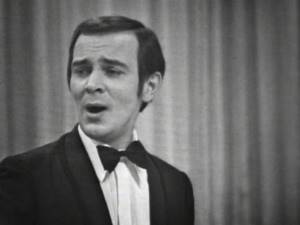
Muslim Magomaev
In the second half of the 1960s, Muslim Magomayev almost became a national idol. He lived in Moscow, and at the same time was the object of worship of the entire multinational Soviet Union. The popularity and fame of Magomayev was partly associated with the songs of another international idol - the Armenian composer Arno Babajanyan, who in the 60s was considered the “king of hits.” A considerable number of compositions he wrote enjoyed great success: “Song about Moscow” (by the way, banned by Khrushchev for sounding like a twist), “Beauty Queen”, “Ferris Wheel”, “Wedding”, “Take your time”. Performing with a repertoire consisting of everyone’s favorite hits, Magomayev quickly turned into the “No. 1 guest performer” of the Soviet Union - a performer for whose performance all the country’s philharmonic societies fought.
The excitement around Magomayev's concert evenings was fantastic. One of the singer’s friends recalls: “Imagine a stadium of 40-60 thousand. The concert ends. A UAZ with an open top drives onto the cinder road. Musya and I stand in it and do the traditional lap of honor. People are running away from the stands, no police can cope with this. The UAZ is lifted and carried in their arms. I swear! Both men and women carried everything. Once in Odessa they lifted the Volga like this and carried it all the way to the Krasnaya Hotel, where we then lived. I wasn’t too lazy, I did the math, and it turned out that the car was in the air for almost three kilometers.”
Magomayev refused to work at La Scala and the Olympia Theater
The rapid success of Muslim Magomayev could, first of all, be explained by his origin. Indeed, it would be quite easy to climb the career ladder, even if the philharmonic in your hometown actually bears your name. Muslim Magomayev was the full namesake of his grandfather, whose name was given to the Baku Philharmonic. Muslim Magomayev Sr. is considered the founder of Azerbaijani classical music. In 1935, he was awarded the title of Honored Artist of the Azerbaijan SSR. Muslim Magomayev's parents were also creative and gifted people. His father, a theater set designer and amateur musician, volunteered for the front, and in 1945, nine days before the end of the war, he died in the town of Küstrin near Berlin. Mother is a theater actress. True, their future illustrious son was raised in the family of his uncle, his father’s younger brother. Jamal-Eddin Magomayev was a prominent party and economic figure. After the war, he took the position of Deputy Secretary of the Central Committee of the Communist Party of Azerbaijan, and later became a member of the Central Committee of the republic, permanent representative of the Council of Ministers of Azerbaijan in Moscow. It would seem that it is the presence of such family ties and biographical circumstances that should explain the rapid success of young Muslim. However, the circumstances of his personal biography did not play such a significant role in Magomayev’s career.
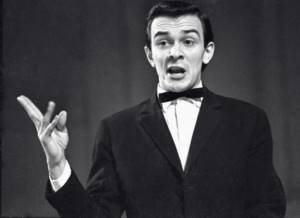
Muslim Magomaev
Immediately after the grandson of the famous Azerbaijani composer was discovered to have hearing loss, he was sent to a music school at the conservatory. The descendant of the glorious Magomayev family was destined for a career as a pianist, but he did not have the necessary diligence to sit for hours practicing scales. Soon the young musician took up vocal art seriously. At the age of 15, he performed his first concert at the Sailor's House, despite the objections of his relatives, who believed that early concert practice could harm the development of his voice. While studying at the vocal department of a music school, he took lessons from the famous Baku conservatory teacher Susanna Mikaelyan. When he sang, students and teachers gathered under the door of Mikaelyan’s office to listen to Figaro’s cavatina from “The Barber of Seville” and Alyabyev’s “The Nightingale,” which Muslim masterfully performed with his ringing youthful soprano.
Already at the age of 31, Magomayev received the title of People's Artist of the USSR
At the age of 20, Muslim Magomayev managed to refute another stereotype - that “stars” from the national republics of the USSR appear mainly according to orders from above and can only serve as decoration for government concerts, presenting mainly folklore repertoire. In 1962, Magomayev performed at the festival of Azerbaijani art in the Kremlin, performing “Buchenwald Alarm” by Vano Muradeli and Figaro’s aria. “This guy doesn’t take care of himself at all if he repeats such a difficult aria as an encore,” the famous opera singer Ivan Kozlovsky said about the concert. Minister of Culture Ekaterina Furtseva remarked: “Finally, we have a real baritone.” This “with us” became an entrance ticket to the host of great “Soviet artists”: now Magomayev’s voice was not only the pride of the country, but also an important element of Soviet cultural export. Through the Komsomol, Muslim Magomayev was able to go on tour to Finland, after which the article “A young man from Baku conquers the world” appeared in the Ogonyok magazine. In 1963, the singer was accepted into the Azerbaijan Opera and Ballet Theater named after Akhundov, but by that time he had already acquired the status of one of the main national treasures: no one thought about his Azerbaijani roots anymore.
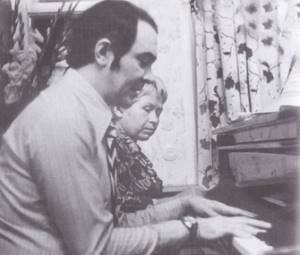
Muslim Magomaev plays the piano four hands with Alexandra Pakhmutova
In 1964-1965, Magomayev completed an internship at the La Scala theater in Milan. None of the other pop performers can boast of such a fact in their creative biography. After touring the USSR with material from “Tosca” and “The Barber of Seville,” Muslim Magomayev was given an offer to come to work at the Bolshoi Theater, but he perfectly understood that his place was on the stage, and therefore the invitation from the main theater of the country was rejected. Triumph awaited Magomayev everywhere. He was even offered to sign a contract with the Olympia Theater in Paris, where he had successful tours in 1966 and 1969. The artist was offered an engagement for a year, but the Ministry of Culture strongly opposed it, because the singer was eagerly awaited at government concerts in the Kremlin. Muslim Magomayev would later write in his memoirs: “It was possible to stay, but it was impossible. And this was one of the few times in my life when the word “impossible”, which I hated, defeated my favorite word “possible.”
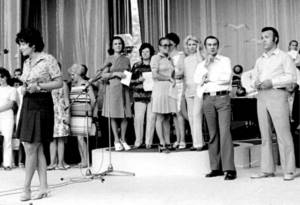
The color of Soviet culture: on the left is Tamara Sinyavskaya, in the center is Klavdiya Shulzhenko, on the right is Muslim Magomayev and Joseph Kobzon. Yalta, Crimean Dawns festival, 1973
This act did not go unnoticed by the government elite: Magomayev received the title of People's Artist of the USSR at an unprecedented young age - 31 years old. His fans included both Leonid Brezhnev and Yuri Andropov: they were very satisfied with the singer’s creative repertoire. Formally, the basis of his programs were arias from operas, romances and songs of patriotic content. However, it is surprising that a completely official, ideologically structured repertoire coexisted in his performances with songs that, in fact, were symbols of Western culture. Muslim Magomayev was able to thoroughly erase the clear boundary between “serious” and “light” music, which existed both at the state level and in the minds of the audience. Magomayev was a kind of mouthpiece through which millions of Soviet citizens were able to join the main musical achievements of the rest of the world.
Music
The artist’s creative biography began in his hometown at the House of Culture of Baku Sailors. Magomayev’s family was afraid for his voice and forbade Muslim to perform in full force, but the 15-year-old boy went on stage secretly from his family, receiving the first applause. He managed to avoid teenage voice mutation.
In 1961, Muslim Magomayev made his professional debut in the Song and Dance Ensemble of the Baku Military District. A year later, he performed the song “Buchenwald Alarm” and his talent was noted at the World Youth Festival in Helsinki. In the same year, in the Kremlin Palace of Congresses, the vocalist won all-Union fame by performing at the festival of Azerbaijani art.
Edita Piekha and Muslim Magomaev
Published Interesting about geniuses and famous personalities Sunday, May 14, 2021
Muslim Magomayev and Edita Piekha
In 1963, in the concert hall named after P.I. Tchaikovsky hosted the singer's first solo concert. In Baku, Magomayev becomes a soloist at the Azerbaijan Opera and Ballet Theater named after Akhundov. In 1964, the vocalist went on an internship at Milan's La Scala theater for 2 years.
In the mid-60s, Muslim Magomayev toured the cities of the Soviet Union with the musical performances “The Barber of Seville” and “Tosca”. The talented vocalist is invited to perform on the stage of the Bolshoi Theater, but Magomaev does not want to limit himself to opera.
In the mid-60s, the singer toured in Paris. Admired by Magomayev’s talent, the director of the famous Olympia, Bruno Cockatrice, offered the singer a contract for a year. They predicted world fame for him, and Muslim Magomayev thought about the proposal. But everything was decided by the USSR Ministry of Culture: the Azerbaijani vocalist is indispensable at government concerts.
In Paris, the artist learned that a criminal case had been opened against him in his homeland. To help the Don Cossack Song and Dance Ensemble, in the late 1960s the singer performed in Rostov-on-Don at a 45,000-seat stadium. Instead of one planned part, Magomayev spent more than two hours on stage. They paid him triple his salary, assuring him that there was no violation of the law and that the rate was approved by the Ministry of Culture. The singer was informed about the criminal prosecution through the OBKhSS during a concert at Olympia. Not wanting to put his family at risk, Muslim Magomayev did not succumb to the persuasion of the emigrants and returned to the USSR.
As a result of legal proceedings, Muslim Magomayev was banned from performing outside Azerbaijan. The singer took advantage of the free time he had and graduated from the Baku Conservatory in singing. The disgrace ended after a call from the Chairman of the KGB of the USSR Yuri Andropov to the Minister of Culture Ekaterina Furtseva: Magomayev was invited to the department’s anniversary concert.
Muslim Magomaev, Svetlana Morgunova, Bedros Kirkorov.
Published by Muslim Magomayev/Muslim Magomayev Saturday, April 30, 2016
Muslim Magomayev, Svetlana Morgunova, Bedros Kirkorov
In Sopot in 1969, Muslim Magomayev won first prize at the International Festival; in Cannes, the International Festival of Recordings and Music Publishing awarded him the “Golden Disc” for millions of records sold. At the age of 31, the singer becomes not only the People's Artist of the Azerbaijan SSR, but also the People's Artist of the USSR.
Since 1975, Muslim Magomayev has led the established pop-symphony orchestra for 14 years. He toured with musicians until 1989 throughout the USSR and foreign countries. Magomayev managed to popularize modern Western trends, which in those years was not approved by the highest party leadership of the USSR. The singer performed the Beatles hit “Yesterday” for the first time in the Soviet Union.
Songs performed by Muslim Magometovich to the verses of Arno Babajanyan occupy a special place in the star’s work. The compositions “Wedding”, “The Best City on Earth”, “Ferris Wheel”, “Illuminated by the Sun”, “Nocturne” are so bright and expressive that the listeners remembered them “right away”.
Magomayev's hit "Beauty Queen" Babajanyan was inspired by a Yerevan beauty contest held in the 60s. The song was the leader in the “Best Song of 1965” competition.
The verses for the poignant song “Blue Eternity” were written for the singer by a friend, Baku resident Gennady Kozlovsky, who moved to Moscow in 1971, and since 1979, at the suggestion of Magomayev, worked as director of the Azerbaijan Variety Symphony Orchestra.
The fate of some songs performed by Magomayev turned out to be difficult. The hit song “The Best City on Earth” with lyrics by Leonid Derbenev and music by Arno Babajanyan was broadcast on the radio for a month, but Nikita Khrushchev saw in the song “the pernicious spirit of the West” and with the words “Twist about Moscow? Ban! gave instructions to take the hit off the air. The song was “rehabilitated” shortly after Khrushchev’s removal from the post of First Secretary of the Central Committee. In 2013, at the celebration of the 866th anniversary of the capital, Magomayev’s hit became the leitmotif of the celebration.
The song “We can’t live without each other” to the words of Alexandra Pakhmutova, performed by Muslim Magomayev, is still a hit these days. The same can be said about the hits of the 70s “Snow is Falling” and “Ray of Golden Sun”. The last composition is heard in the sequel to the animated film “The Musicians of Bremen”, where it is presented as a Troubadour serenade.
The peak of Muslim Magomayev's musical career was in the 60s and 70s. The singer gathered stadiums in the cities of the USSR, and was received with admiration by the concert and opera stages of the world.
Muslim Magomayev and Joseph Kobzon
In 1998, Muslim Magomayev stopped performing on stage. He stated that each talent has its own time, which cannot be overstepped. The artist devoted the last decade to painting, lived in Moscow, and communicated with fans through the website.
For decades, the artist was friends with the President of Azerbaijan Heydar Aliyev. After the death of a friend in 2003, Muslim Magomayev became isolated. A sick heart and lungs worried the star more and more often. But according to his wife Tamara Sinyavskaya, Muslim Magometovich smoked three packs of cigarettes a day. The singer quarreled with Polad Bulbul-oglu, who took the post of Minister of Culture of Azerbaijan, and criticized his policy in the cultural sphere of the country.
In 2005, Magomayev accepted Russian citizenship, but considered himself an Azerbaijani and was part of the leadership of an all-Russian public organization that united the Azerbaijani diaspora of the Russian Federation.
In 2007, Magomayev wrote his last song, “Farewell, Baku!” based on poems by Sergei Yesenin.
Cause of death of Muslim Magomayev
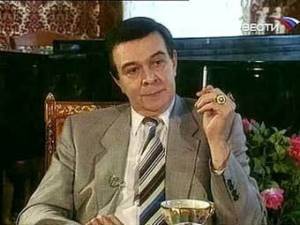
Calling Russia his mother, Muslim Magomayev considered himself an Azerbaijani, although Turkish, Adyghe and Russian blood were mixed in his veins. Everyone loved him and for representatives of any people of Russia he was a real folk singer. The creative activity of this wonderful artist, singer and composer, covered classics and pop, national and foreign art. His whole life was entirely devoted to the stage. The cause of death of Muslim Magomayev was heart disease.
He was born in 1942 in Baku. His grandfather was Abdul-Muslim Magomayev, a famous Azerbaijani composer. My father died in the war, just 15 days before the Victory. His mother, actress Aishet Kinzhalova, left for the Far East, where she got married, and the boy remained in the family of his grandfather and uncle. Since childhood, he had an excellent ear for music and a strong voice. The first public performance of the 15-year-old singer took place at the House of Culture of Baku sailors, despite the prohibitions of his relatives, who were worried about his voice.
Then, in 1961, followed by work in the Song and Dance Ensemble of the Baku Military District and the first prize of the laureate in Helsinki at the World Festival of Youth and Students for the performance of the song “Buchenwald Alarm”. The singer's first solo concert took place in 1963 at the Concert Hall. Tchaikovsky. Having become an opera singer, Magomayev did not stop performing on stage and in the late 60s, after his second performance at the famous Parisian Olympia Theater, he received an offer of a contract there. The Soviet government did not give him such an opportunity.
Once he was almost put on trial for performing in Rostov and was banned from touring outside Azerbaijan. He used this time to graduate from the Baku Conservatory, and then was again called to perform in Moscow: they could not do without him. In 1973, after many victories and awards at home and abroad, Muslim Magomayev was awarded the title of People's Artist of the USSR.
His popularity in the 60-70s broke all records. He made endless tours with his orchestra, released thousands of records, participated in all government concerts, and traveled abroad. His repertoire included more than 600 songs and 20 of them were written by the singer himself. One of the minor planets of the solar system received his name. In 1998, Magomayev ended his concert activities and began to live a private life in Moscow. His wife, opera singer Tamara Sinyavskaya, recalled that he smoked 3 packs of cigarettes a day.
Many experts argue that smoking weakens the body and puts it at risk for a variety of diseases. The singer had coronary heart disease, which develops unnoticed and does not like tobacco abuse - that’s why Muslim Magomayev died at the age of 66. It is difficult to say whether they are right or wrong: in the life of this great artist there was a lot of excitement that could tear the heart. Magomayev died in October 2008 in the arms of his wife.
He is buried in Baku on the Alley of Honorary Burials next to his grandfather.
Death
At the age of 60, Magomayev left the stage: his illness worsened. The soloist could not lead his old lifestyle, perform on stage or tour.
On October 25, 2008, Muslim Magometovich Magomayev passed away; he died in the arms of his wife Tamara Sinyavskaya. The cause of death of the great singer was coronary heart disease and atherosclerosis.
Published by Fuad Muradxanli Wednesday, August 21, 2019
Milos Bikovich as Muslim Magomayev
The farewell ceremony for the great artist took place at the Tchaikovsky Concert Hall in the capital. According to the will, Magomayev’s ashes were taken to his native Baku and buried in the Alley of Honor, where the famous grandfather Abdul-Muslim Magomayev rests.
How he became famous
The Azerbaijani singer gained popularity in 1963, when he performed at the last concert dedicated to Azerbaijani creativity in the Kremlin Palace of Congresses. In the same year he became a soloist at the Opera and Ballet Theater in Baku. The following year he leaves to practice at the Italian La Scala; the internship continues until 1965. In 1966, and three years later, he performed in France at the legendary Olympia Theater.
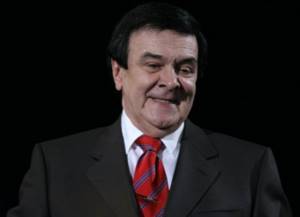
There he was offered an individual contract, and the theater director promised to make him a world celebrity. Magomayev himself seriously thought about accepting this offer, however, the Ministry of Culture of the Soviet Union referred to the singer’s employment within the country. In 1969, at the French Cannes music festival, Magomayev received the Golden Disc award, and the following year he was awarded the same award.
In 1973 he became People's Artist of the Soviet Union. From 1975, for 14 years, he was the director of the Azerbaijan Pop Symphony Orchestra, which he created. He performed with him a lot throughout the Soviet Union. Due to failing health at the age of 60, he left the stage forever to save it.
Memory
In 2020, the series “Magomayev” was shown, dedicated to the fate and work of the great artist. The main role went to Milos Bikovich. The singer's wife, Tamara Sinyavskaya, was played by Irina Antonenko. Also in the biographical film are actors Svetlana Ustinova, Alexander Nesterov, Alena Ivchenko.
Discography
- 1995 – “Thank you”
- 1996 – “Arias from operas, musicals (Neapolitan songs)”
- 2001 – “Love is my song (Dreamland)”
- 2002 – “Arias from Operas”
- 2002 – “Songs of Italy”
- 2002 – “Concert in the Tchaikovsky Hall, 1963”
- 2003 – “With love for a woman”
- 2003 – “Rhapsody of Love”
- 2004 – “Muslim Magomaev. Improvisations"
- 2005 – “Muslim Magomaev. Concerts, concerts, concerts"
- 2006 – “Muslim Magomaev. Arias of P. I. Tchaikovsky and S. Rachmaninov"
The rapid start of a creative journey
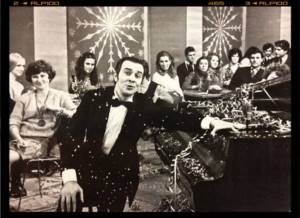
Muslim Magomayev concert after concert, this is how his life went
In 1959, Muslim graduated from music school, continued to perform at various concerts, and two years later became a soloist in a professional song and dance ensemble at the Baku Military District. Concert activity did not interfere with the continued professional development of the young artist; filigree work on developing his voice continued.
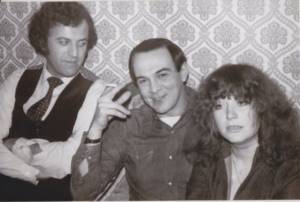
Muslim Magomayev and other celebrities of that time
The first awards and prizes appeared, and in 1962 Muslim Magomayev went to his first performance at an international venue in Helsinki, as part of the delegation of our country. Glory came with lightning speed and deafening, Muslim became a laureate at this festival of youth and students, performing the amazing song “Buchenwald Alarm”.
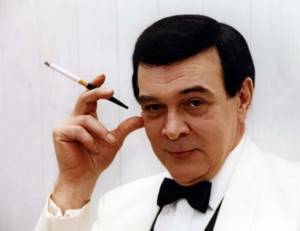
Muslim Magomayev in his mature years
The older generation of our country remembers very well the impression of hearing the song - it was a real shock, goosebumps ran through the body, tears in the eyes and a lump in the throat.
The country, which had recently defeated a terrible evil and lost its best sons, froze at such a performance - they were proud of such a compatriot.




